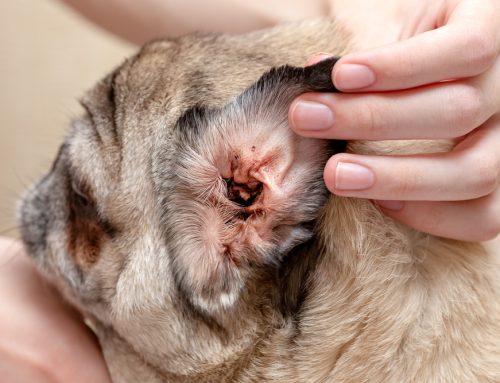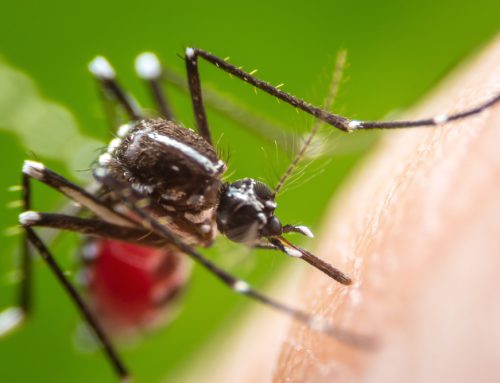Widely prevalent right here in our own backyards, heartworm disease impacts dogs and cats across the United States. Here’s how heartworm disease can affect your pet, and why preventing this potentially deadly disease is far easier than treating it.
How heartworm disease is transmitted
Heartworm disease has been diagnosed in dogs in all 50 states, although prevalence is more common in warmer, more humid parts of the U.S. Caused by the parasitic worm Dirofilaria immitis, heartworm disease is spread through the bite of an infected mosquito.
The offspring of female heartworms—microfilariae—are transmitted to a mosquito when it bites an infected dog. Microfilariae must develop into larvae within the mosquito to become infective. The larvae are then transmitted to their primary host when the mosquito bites a dog. Once a dog is infected, the larvae migrate to the heart, lungs, and surrounding blood vessels to grow and reproduce. It takes approximately 6 months for the larvae to develop into mature heartworms. At maturity, heartworms are able to mate and reproduce, which will continue the lifecycle of the parasite.
A heartworm can grow to be up to 12 inches long and can live for 5–7 years. Dogs with severe infections can have more than 200 worms in and around the blood vessels surrounding the heart.
Signs of heartworm disease in dogs
Dogs don’t show signs of heartworm disease until mature worms are present. Once mature worms begin multiplying and the worm burden increases, symptoms become progressively worse. Signs to watch for:
- Lethargy
- Coughing
- Weight loss
- Tiring more easily
- Difficulty breathing
In more advanced stages, dogs can develop caval syndrome. This condition occurs when blood flowing back into the heart is blocked by the heavy worm burden. While it can potentially be surgically corrected, caval syndrome is usually fatal.
Treating heartworm disease in dogs
The goal of treatment is to kill all life stages of heartworms with as few complications as possible. A complete blood count and chemistry panel will be performed to ensure your dog is healthy enough for treatment. A urinalysis is done to evaluate kidney function, and chest X-rays are taken to evaluate damage to the lungs and heart.
Medication used to kill adult worms is injected deep into the muscles of the lower back. Several injections may be needed depending on the severity of heartworm disease present. Medications are also used to kill circulating microfilariae, decrease inflammation, and kill bacteria associated with the heartworms.
Strict rest with short leash walks for bathroom breaks only is required throughout treatment. As worms decompose, fragments can block blood flow through the lungs, causing sudden death. Increased blood flow to these vessels, which occurs during activity and exercise, makes blockage more likely.
Heartworm disease in cats
While dogs are the natural host of heartworms, cats can also be affected. Cats are not ideal hosts, as the larvae tend to die before maturation. Even if they do make it to adulthood, worms cannot reproduce within the cat, so cats are typically only infected with the few worms that were passed from the mosquito. While cats don’t develop a large worm burden like dogs can, the few worms that are present can cause inflammation and clinical signs, such as:
- Coughing
- Vomiting
- Difficulty breathing
Many affected cats show no clinical signs. Unfortunately, sudden death is possible, even with no prior symptoms. There are no safe medications available to kill adult heartworms in cats, so prevention is crucial.
Preventing heartworm disease in dogs and cats

Pets living in areas with large mosquito populations, such as hot, humid locations near water sources, are at an increased risk of contracting heartworm disease. However, dogs and cats across the country should be given year-round preventive medications. A heartworm test is performed prior to administering heartworm preventive, with the exception of puppies under six months old. This test is repeated annually to ensure the preventive is working as intended. With a variety of options—from monthly topical products to chewable treats— prevention is simple.
Is your pet due for a heartworm test or preventive refill? Call us at 256-859-2221.








Leave A Comment